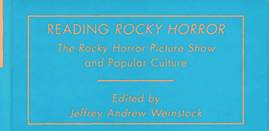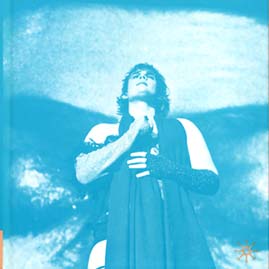 Page updated Sunday, January 11th, 2009 |
|
The Rocky Horror Picture Show and Popular Culture book by Jeffrey Weinstock | |
The Rocky Horror Picture Show And Popular Culture Edited by Jeffrey Andrew Weinstock A review by Kevin McEwen An associate Professor of English Literate and languages at Central Michigan University, Jeffrey Andrew Wienstock has already authored several academic books on cult phenomena and it's effect on popular culture: South Park, The Blair Witch Project and The Rocky Horror Picture Show have all come under his scrutiny in the past. In his latest book, Weinstock has brought together a group of "wacky academics" (as he calls them) to dissect, speculate and generally muse about our favourite cult film in a collection of essays that view Rocky from a wide range of perspectives taking in amongst others: gender, disability and religion. With two of the chapters called "What We Are Watching" Does Not Present "Us with a Struggle": Rocky Horror, Queer Viewers, and the Alternative Cinematic Spectacle" and "In Search of the Authentic Queer Epiphany: Normatively and Representation of the Queer Disabled Body in Rocky Horror" and a price tag of around £45.00 you know this isn't the normal Rocky Horror fun facts/ potted history type of book that Rocky fandom is used to. This is a serious grown up scholarly book, and for me it was a tough but rewarding read. The chapters are densely typed (the book is a small 8x5 inch hard back) and not easy on the eyes. It is a heavy mixture of facts, speculation, ramblings, strong opinion and the odd black and white photograph taken from the film, sunk into the text. The book is meant as a serious study guide to cinema/gender/popular culture and not meant to be read as I did (for the purposes of this review for Timewarp) quickly, all at once in a couple days. It is a book to read, return to, savour, digest and peruse at your leisure, for there is plenty to enjoy here. You may, like me, find yourself nodding in agreement at Sue Matheson's comparison between Franks' "Come up to the lab" and Mae West famous catchphrase, in her piece comparing Rocky to Hollywood icons. Only to shake your head later on when Matheson suggests that the placing of Nixon's resignation speech on Brad and Janet's car radio was not, as I thought, a goof on the part of the author, (Nixon's speech aired on the evening of 8th August 1974 while the Criminologist states the events took place "that late November evening") but rather a deliberate suggestion to viewers of the film by the author that Brad and Janet are now caught in an actual Timewarp on their fateful journey. Julian Cornell's "Rocky Horror Glam Rock," paper is an interesting take on the whole glam rock/Rocky/androgyny period. The Glam rock front man wasn't just a singer in the normal convention of lead singer, he was also a Showman, up there strutting his stuff, posing like a peacock wrapped in tinfoil. Cornell goes on to say how both Rocky and Glam blur the differences between male and female front singer with their make up and sparkle but at the same time never loosing the masculine hard image. I have always found the best actors who have played Frank have managed that difficult combination playing the campy side but at all times playing that masculine threat. Think how feminine Tim's Frank appears, but let's be honest aren't you just a little bit scared of him at the same time? When Tim strides across the screen you simply can't take your eyes off him. Think back, when was it that you first remember, not watching Tim in Sweet Transvestite but finally concentrated at the others on screen? It's easy to see why so many people who were there have stated disgraced glam rocker Gary Glitter was at the time a natural on stage for Frank in 1978. Again, here is were author and reader differ with Cornell believing that Eddie's character is less like Elvis and more like Glitter. In his essay Jeffery Andrew Weinstock repeats his theories from his previous book, on fans and Picture Show audience participation in particular, that may ruffle a few feather boas among those who have been part of shadow casts. Weinstock believes that the fans attempt to firstly, actually "be" part of the film by mimicking the action and dialogue and secondly, try to control the film by use of the AP but fail at both. It is a controversial, complex theory which runs over many pages and deserves more thought. So before you dismiss it out of hand, let me say while I don't agree that anyone shadow casting actually believes they can "be" the film or become the film, (shadow casting is done out of a love of performance surely?) I have certainly seen stage show AP where it has seemed liked a battle of wills to get the upper hand from those on stage and if not control, then certainly obtain recognition from the players. Kristina Watkins-Morninos "The Cult and it's Virgin Sacrifice: Rites of Defloration in and at The Rocky Horror Picture Show" her own take on the preshow virgin sacrifice experience, makes sober reading. The light hearted (albeit smutty) humiliation in the cinema before the film of those who have not seen the film before reads slightly creepy when taken out of context. The other essays are written in the same style, each as studious and compelling as the last raising questions, opinions and issues that can't and indeed shouldn't be answered here. Each individual essay ends with a list citing the works mentioned and further notes which expand on the text. It was fun to see Timewarp.org.uk cited as a point of reference for the "traditional fan preshow versus Singa-longa" debate in one essay and Belfast's Lip Service get a name check elsewhere as an example of the ingenuity of fan cast names. There is also plenty to learn from the book, for example did you know that in 2001 4,446 children did the Timewarp simultaneously at the NEC in Birmingham to get into the Guinness Book of Records? Or that the old AP line "And I helped" which follows Magentas line "Dinner is prepared" is taken from a 1979 American food commercial for a product called "Shake-N-Bake"? Although one mistake I noticed was in his introduction to the book and the history of the stage show Weinstock cites from another book "Midnight Movies" by J Hoperman (published in 1983) stating that for the American stage show "(Lou) Adler brought over part of the London cast, including O'Brien, Curry and Meatloaf" I think Paddy O'Hagan would have something to say about that. I have a feeling that the price of the book will sadly be out of range for the majority of fans which is a shame. My advice is to obtain a copy through your Uni or local Library, it's worth tracking down. I enjoyed reading this book, it's academic style and content challenged me as a reader and as a fan of the subject. There will be those fans that won't be open to the ideas and opinions contained in the book which is a shame. There's stuff I agreed with and plenty more I certainly didn't, but it all made me a think and re-evaluate my thoughts on the show and realise why I enjoy it still, so surely that can only be a good thing? Plus if nothing else, 36 years on, the fact that Richard O'Brien's musical can still generate such serious thought and debate to merit an academic book, is quite an achievement and one that should make him and us very proud indeed. K. McEwen 6/1/09 |
![]()
![]() Top of Page
Top of Page ![]() Print page
Print page ![]() Email this to a friend Copyright ©TimeWarp fan club
Email this to a friend Copyright ©TimeWarp fan club

